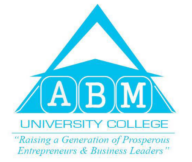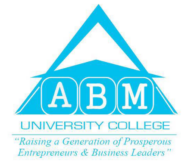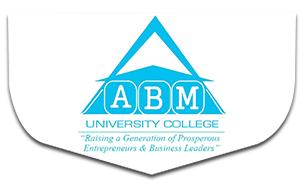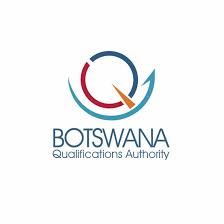Diploma In Financial Management

INTAKES: March/ August

Programme Structure
Program Structure

1. Programme Overview |
|---|
ABM University College offers a Bachelor of Commerce in Financial Management, designed to equip students with specialized knowledge, skills, and competencies in financial management. This four-year program prepares graduates for various roles in the financial sector.
The Bachelor of Commerce in Financial Management focuses on providing students with a comprehensive understanding of financial principles and practices. While specific course details are not provided in the available sources, similar programs typically cover topics such as:
These subjects aim to develop a student's ability to analyze financial information, make informed decisions, and effectively manage financial resources within an organization. For more detailed information about the program, including admission requirements and course specifics, it is recommended to contact ABM University College directly or visit their official website |
2. Entry Requirements | |
|---|---|
Direct entry scheme | BGCSE/IGCSE minimum of 30 points Core Subject: English: (D), Mathematics: (C), Business Studies/Commerce/Statistics is an added advantage. |
Mature Entry Scheme: | 25 years and above with a minimum of 3 years relevant work experience. |
Other Qualification Holders | Holders of qualifications from other bodies can be admitted to the various levels of the programme subject to approval by Admissions Committee. |
3. Transfer Requirements
| |
|---|---|
Direct entry scheme | BGCSE/IGCSE minimum of 30 points Core Subject: English: (D), Mathematics: (C), Business Studies/Commerce/Statistics is an added advantage. |
Mature Entry Scheme: | 25 years and above with a minimum of 3 years relevant work experience. |
Other Qualification Holders | Holders of qualifications from other bodies can be admitted to the various levels of the programme subject to approval by Admissions Committee. |
4. Fees | |
|---|---|
Direct entry scheme | BGCSE/IGCSE minimum of 30 points Core Subject: English: (D), Mathematics: (C), Business Studies/Commerce/Statistics is an added advantage. |
Mature Entry Scheme: | 25 years and above with a minimum of 3 years relevant work experience. |
Other Qualification Holders | Holders of qualifications from other bodies can be admitted to the various levels of the programme subject to approval by Admissions Committee. |
5. Career Paths/Opportunities |
|---|
1. Corporate Finance
2. Banking and Financial Services
3. Investment and Portfolio Management
4. Risk and Compliance
5. Entrepreneurship and Consulting
6. Government and Public Sector
7. Further Studies and Specializations
|
Module Name | Credits |
|---|---|
English Language Skills | 10 |
Basic Economics | 10 |
End User Computing | 10 |
Accounting and Finance | 10 |
Ethics and Society | 10 |
Commercial Law 1 | 15 |
Business Mathematics | 10 |
Business Communication | 15 |
Fundamentals of Operations Management | 10 |
Functional Areas of Management | 15 |
TOTAL CREDITS | 115 |
Module Name | Credits |
|---|---|
Cost Accounting and Management Accounting 1 | 10 |
Business Statistics | 15 |
Principles of Management | 10 |
Financial Accounting | 10 |
Computerised Accounting | 15 |
Cost Accounting and Management Accounting 2 | 15 |
Financial Management | 15 |
Working Capital Management | 15 |
Auditing 1 | 15 |
TOTAL CREDITS | 135 |
Module Name | Credits |
|---|---|
Fundamentals of Project Management | 15 |
Microeconomics | 15 |
Commercial Law 2 | 15 |
Capital Budgeting | 15 |
Financial Control and Planning | 15 |
Industrial Attachment | 40 |
Principles of Human Resource Management | 15 |
Macroeconomics | 15 |
Research Methodology | 10 |
Financial Markets | 15 |
TOTAL CREDITS | 185 |
Module Name | Credits |
|---|---|
Taxation 1 | 15 |
Financial Risk Management | 15 |
Undergraduate Major Research Project 1 | 15 |
ELECTIVE (CHOOSE 1) |
|---|
Module Name | Credits |
|---|---|
Strategic Management | 15 |
Audit Practice and Assurance | 15 |
Taxation 2 | 15 |
Investment Management | 15 |
Financial Control and Planning | 15 |
Undergraduate Major Research Project 2 | 15 |
ELECTIVE (CHOOSE 2) |
|---|
Module Name | Credits |
|---|---|
Finance and Business Ethics
| 15 |
Operations Management | 15 |
Taxation 2 | 15 |
Investment Management | 15 |
Financial Control and Planning | 15 |
TOTAL CREDITS | 120 |
PROGRAMMES
Frequently Asked Questions

The FAQs below are only specific and relevant to Bachelor of Commerce in Financial Management

Frequently Asked Questions
The FAQs below are only specific and relevant to Bachelor of Commerce in Financial Management
The program includes key financial management areas such as:
- Corporate Finance
- Investment Analysis and Portfolio Management
- Financial Risk Management
- Financial Markets and Institutions
- Managerial Economics
- Cost and Management Accounting
- International Finance
- Financial Planning and Strategy
Graduates can pursue careers such as:
- Financial Analyst
- Investment Banker
- Risk and Compliance Officer
- Treasury Analyst
- Portfolio Manager
- Financial Consultant
- Credit Analyst
- Corporate Finance Manager
The curriculum aligns with globally recognized certifications such as:
- Chartered Financial Analyst (CFA)
- Certified Financial Planner (CFP)
- Financial Risk Manager (FRM)
- Chartered Institute for Securities & Investment (CISI)
- Association of Chartered Certified Accountants (ACCA – Financial Management)
Yes, students engage in:
- Case studies on corporate finance and investment decisions
- Financial modelling and simulations
- Internship opportunities with financial institutions
- Hands-on training with financial software like Excel and Bloomberg
Graduates find opportunities in:
- Banking and Financial Services
- Insurance and Risk Management
- Investment and Asset Management
- Government and Public Sector Finance
- Corporate Treasury and Financial Planning
- Consulting and Advisory Firms
Strong industry linkages with financial institutions for internships and job placements
- A curriculum designed to match global financial industry standards
- Opportunities for networking and mentorship from finance professionals
- A balance of theoretical knowledge and hands-on financial training
Yes, students may choose electives or specialization tracks in areas such as:
- Investment and Portfolio Management
- Financial Risk Management
- Banking and Credit Analysis
- Corporate Finance Strategy
Discussions & Comments

Drop your question or comment and lets discuss.

Discussions & Comments
Drop your question or comment and let's discuss about Bachelor of Commerce in Financial Management.
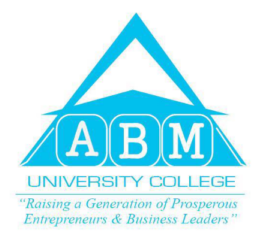
CONTACTS
STAY UPDATED, ALWAYS!
Sign up for ABM latest news & articles. We won’t give you spam mails.
Developed by AfroAgileSoft™
